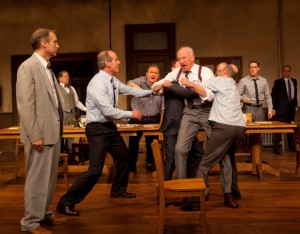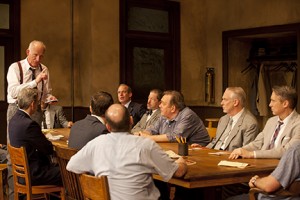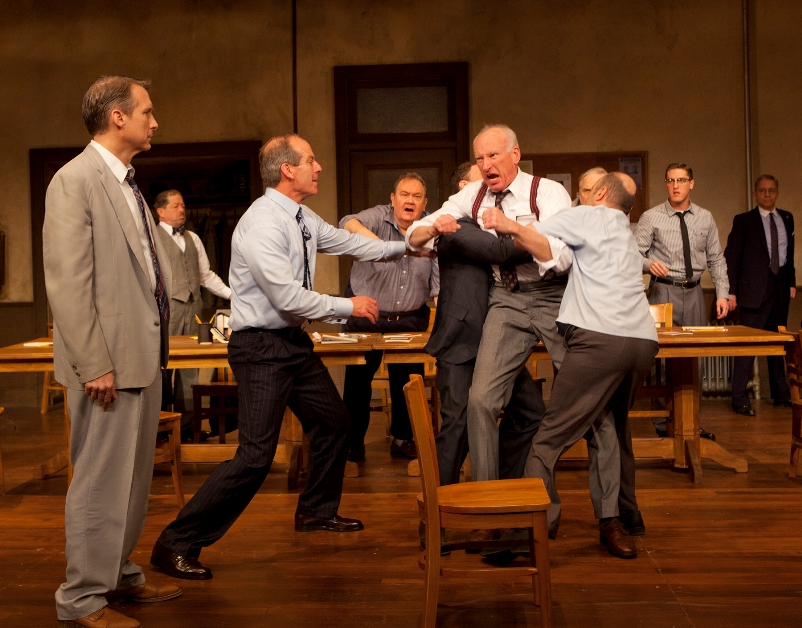
Gregg Edelman, Jonathan Hadary, John Bolger, David Schramm, Michael Sirow, James Rebhorn, Terry Layman, Lee Sellars, Scott Drummond and David Adkins in a scene from George Street Playhouse's TWELVE ANGRY MEN. (Photo credit: T. Charles Erickson)
What if the tyrant listened to the chorus leader, however unwillingly? What if—maybe just once—Tiresias successfully tore down the obstinance of Oedipus or Creon? What might the world look like if these were not such ridiculous propositions, and blind determination was not necessarily destined to win the day? It might look something like the jury room of Reginald Rose’s TWELVE ANGRY MEN, where the only constants from the play’s opening are that deliberation will at least have a voice—however solitary—and that questioning will at least have a captive audience—however begrudging.
An intellectually stimulating play that asks us to reinvestigate everything about which we think we are so certain, TWELVE ANGRY MEN shows us the tense, often heated deliberations of a jury trying to come to a consensus on a murder verdict. It is 1954, and a sixteen-year-old boy from the slums of New York has been accused of killing his father with a switchblade to the chest. Conviction would mean the electric chair, while acquittal carries the proverbial danger of letting a murderer loose in society. The play opens with a voiceover of the judge giving the jury their marching orders, and stressing the weightiness of their task: one man is dead, another’s life hangs in the balance of their deliberations. If they are convinced, the men must return a guilty verdict, sealing the boy’s fate, but if there is any shadow of a reasonable doubt, they must find him not guilty, setting the boy free. Eleven of the twelve are convinced of guilt before the ring of the gavel leaves their ears, but Juror Eight has his doubts, and he is resolute that the men will at least have a discussion before sending a sixteen-year-old headlong into the electric chair.
An honest and direct production, George Street Playhouse’s TWELVE ANGRY MEN accentuates the layers of tension underlying this play with admirable clarity. Director David Saint deftly marshals a large ensemble, brimming with talent, in a thorough examination of both the depth of each character, as well as the collective id permeating the jury room. For, although little certainty is revealed to the audience about the defendant’s identity, we know he is an Other to the twelve white men of the jury; being referred to as an exemplum of “those people” who we find out “look different” than the men on stage, the clear implication is that the boy is an African-American living in a racially divided city. As a result, the mostly unspoken question of the proceedings is exactly how valuable these white men—collectively and individually—consider the life of a just another non-descript black boy from the slums. That question proves not to have a simple answer, and we watch as personal prejudice, bigotry, and anger gradually reveal themselves as motivators of much of the so-called certainty at play in the jury room.

James Rebhorn, John Bolger, Jonathan Hadary, David Schramm, Terry Layman, Gregg Edelman, Lee Sellars, Michael Sirow and David Adkins are members of the jury in TWELVE ANGRY MEN running at George Street Playhouse in New Brunswick, NJ through April 8. (Photo credit: T. Charles Erickson)
Before Friday’s opening-night performance, Mr. Saint joked about the production’s troubled “jury selection process,” which saw the relatively last-minute replacement of several actors, but however fraught the process may have been, the product is an impressive array of talented performers. While its plot and ethical dilemmas are not to be discounted, TWELVE ANGRY MEN is in many ways an acting showcase. Rarely in theater is there as much room as this play provides for several boldly drawn characters in the same show (let alone the same room), an opportunity that Mr. Saint and his ensemble grasp eagerly. David Schramm as the gruff, bombastic, and irascible Juror Ten locates impressive nuance in a character that could easily slide into parody or caricature. Juror Ten gives most direct voice to the racist undertones attendant upon the deliberations, but Mr. Schramm manages to show us a character who is not simply an invented figment of racism, but rather a realistic, still timely, and therefore disturbing portrayal of the fear and desperation fueling the dehumanizing hatred of bigotry. James Rebhorn is equally as impressive in crafting Juror Three, the character who traverses the most emotional peaks and valleys while facing the most haunting of personal demons. In his outbursts of anger and flirtations with violence, Mr. Rebhorn makes clear that much of Juror Three’s angst originates from deep within.
As the lone original holdout of a guilty verdict, Gregg Edelman’s Juror Eight occupies a space somewhere between a Greek chorus leader and Columbo: he is steadfast both in his moral imperative and in his conviction that there is more to the story than may appear. As the play progresses, Mr. Edelman shows us a Juror Eight never wavering in his insistence that the men owe the defendant a deliberation, while growing increasingly confident in his ability to identify and scrutinize the root of each of his peer’s certainty. As the questioning stance of Juror Eight never presumes certainty, we might add Socrates to the complex stew of Mr. Edelman’s subtly commanding performance: he knows simply that he does not know for sure, and he is determined that uncertainty be given its due.
With a set beautifully designed by R. Michael Miller to capture an appropriate sense of sterile drabness (and featuring one wonderfully creative bit of theatrics), and costume and sound designs by Esther Arroyo and Christopher J. Bailey that heighten the tension of the play’s one room with a clear sense of overbearing late-summer heat, George Street’s TWELVE ANGRY MEN captures the essence of a classic American play by offering a crisp and unclouded production. At stake is the degree to which apparent certainty can be called into question, certainty about both a course of action, and about the value of other human life. Tiresias may not be able to convince Creon of his wrongheadedness in time to save Antigone, but this play wonders openly whether the American justice system and the collective conscious of twelve nameless strangers might be able to conquer the demons of presumed certainty.
TWELVE ANGRY MEN
by Reginald Rose
Directed by David Saint
March 13 – April 8, 2012
George Street Playhouse
9 Livingston Avenue
New Brunswick, NJ, 08901
732-246-7717
http://www.georgestreetplayhouse.org/



1 comment
Another great review, Professor Maley! I agree that in the hands of a less talented ensemble, the jurors could blend together or seem like caricatures, but this cast was great.